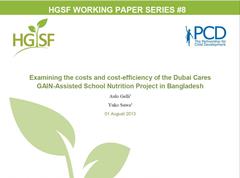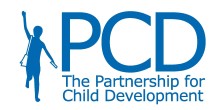 HGSF Working Paper Series #8 Evaluating the costs of the School Nutrition Project in Bangladesh
HGSF Working Paper Series #8 Evaluating the costs of the School Nutrition Project in Bangladesh
 School feeding programmes exhibit different, context-specific models or configurations. A key activity in the Partnership for Child Development research programme involves understanding the trade-offs in terms of cost-efficiency of different school feeding supply chain models. Cost estimates of school feeding programmes generally do no capture contributions made by the community at the school level. In fact only one study in the literature includes full costing across the supply chain.
School feeding programmes exhibit different, context-specific models or configurations. A key activity in the Partnership for Child Development research programme involves understanding the trade-offs in terms of cost-efficiency of different school feeding supply chain models. Cost estimates of school feeding programmes generally do no capture contributions made by the community at the school level. In fact only one study in the literature includes full costing across the supply chain.
Though there is a dearth in the evidence on the benefits of school service provision at the community level, conceptually, school feeding service provision can direct financial resources in the school community through two main channels, funds for food procurement and funds for support services in terms of food management and preparation. In terms of food preparation, emerging evidence suggests the potential for community development benefits but this remains another important area of future research.
The purpose of this analysis is to examine the Dubai Cares/GAIN-Assisted School Nutrition Project in Bangladesh, conducting a high-level supply and value chain analyses of the cluster kitchen model, examining costs, cost-efficiency and cost drivers to support policy and planning.
The findings highlight how Dubai Cares/GAIN SNP provides an example of an innovative school feeding model, combining emphasis on high quality meals service delivery with strong community engagement. The model is involves the provision of diverse and nutritionally balanced meals, integrating school meal service within a broader framework of school-health interventions. The cluster kitchen model also integrates a strong community development component engaging mothers in the service delivery.




